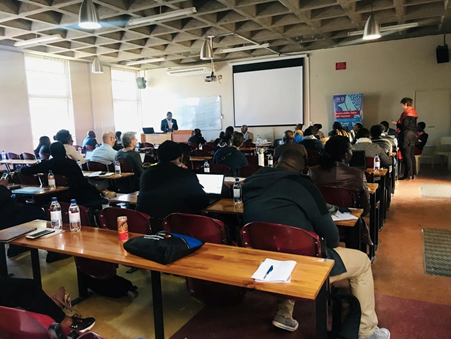
The 40th Conference for the Environmental Education Association of Southern Africa (EESA), held at the University of Namibia from 23rd to 25th August 2022, featured a very esteemed activity, Sustainability Starts with Teachers (SST) policy dialogue. SST is a capacity building programme for teacher and TVET educators in mainstreaming Education for Sustainable Development (ESD). The policy dialogue came at the back of a milestone in the Southern Africa Development Community (SADC) where the first ever ESD Regional Strategic Framework (2022-2030) has been developed and adopted by 16 member states.
In her opening remarks at the SST policy dialogue, Distinguished Professor Heila Lotz-Sisitka, who is leading the implementation of the SST programme from the Environmental Learning Research Centre (ELRC) at Rhodes University in South Africa, identified an expressed need for ESD stakeholders to utilise existing knowledge and expertise that has been developed in the SADC region. In concurring with Prof Lotz-Sisitka, SST Project Officer from UNESCO Regional Office for Southern Africa (ROSA), Dr Charles Chikunda emphasised that countries need to build on a long history of ESD in the SADC region in drafting their ESD policy frameworks. Dr Chikunda remarked, “You cannot implement ESD alone. You rather work with others”. In this regard, Dr Chikunda requested countries to learn from the evident practices of Namibia, which has a national ESD policy already. Dr Chikunda also shared efforts the SST programme is undertaking towards formulating national ESD policies, with Malawi and Zambia already conducting stakeholder meetings for developing their national ESD policies.
One challenge identified by the panellists, who are all UNSECO Regional Reference Group Members for ESD and who are leading with policy dialogue activities in their countries, is that policy can end up being rhetorical if not put into practice. It was said that SADC countries tend to formulate good-worded policies, but implementation remains a big challenge. In reflecting on this challenge, SST Reference Group Member (RGM) for South Africa, Dr Zintle Songqwaru, argued that there is a need to embrace an interactionist model for ESD policy formulation and implementation. Dr Songqwaru said, “We do not have to wait for government policy processes to incept ESD activities. We should rather continue up with our activities, and policies should just come in as catalysts in the process”.
Other points that were raised in terms of ESD policy development and engagement was the need to revitalise existing policy activities, and draw on what has already been done rather than just re-inventing new wheels. At the same time ESD policy needs to be aligned with and updated with the SADC ESD Strategic Framework and the UNESCO ESD 2030 processes. Discussions also included the need for inter-sectoral synergies, partnership building, and strengthening the policy cycle through ongoing policy, practice, research and monitoring and evaluation processes.
The deliberations in the SST policy dialogue resonated with the 40th EEASA Conference 2022 theme of “Education for a post Covid-19 recovery and attaining the SDGs: Reconsiderations, challenges and opportunities”. The conference brought together Environmental Education and ESD stakeholders in the academia, schools, government ministries and civil society from 16 SADC countries.
